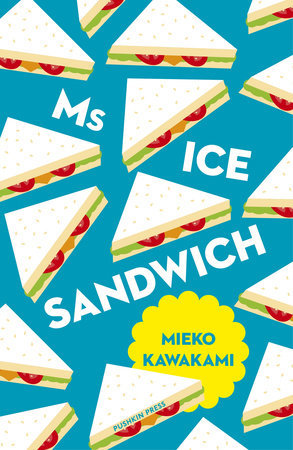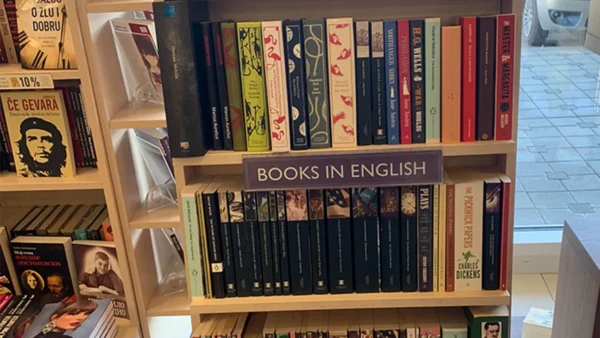Ms Ice Sandwich is a beautiful and endearing novella about a young boy’s innocent crush on a grocery-store clerk.
It’s January, and that means it’s time for Japanese Literature Challenge 15! I chose to read Ms Ice Sandwich by Mieko Kawakami, an endearing novella about a boy’s first crush.
The boy is in fourth grade, which I think makes him about nine or ten, so there’s a sweetness and innocence about his obsession with the grocery-store clerk he nicknames Ms Ice Sandwich. We know it won’t lead to a real, adult relationship or anything like that, but it’s still intriguing to see how it will play out.
In a way, it’s a story about learning to be an individual. Early on, our narrator is so obsessed with Ms Ice Sandwich that he goes to the store every day and lines up to buy as many sandwiches as his meagre pocket money will allow. We get some beautiful and tender descriptions of his confused but powerful feelings, and Kawakami does a great job of rendering adult feelings in a child’s voice:
“I concentrate on Ms Ice Sandwich and I don’t ever want my turn to come. I hardly blink. Then when she finally takes my money and gives me the change and her eyelids turn upwards and I can see those great big eyes again, without any warning that squishy, yellowy, orangey stuff inside my head becomes extra bright, then that hollow place right under my chin, above my collarbone, feels like it’s being squeezed really tightly. It’s like that feeling you get when you swallow rice without chewing it properly first.”
But things change when he overhears some girls in his school calling his beloved Ms Ice Sandwich a “freak” and “some kind of monster”. There’s a mention of facial reconstruction, and some kind of mistake. He doesn’t understand, and he wants to defend her, but he doesn’t. And then, he stops going to the grocery store.
He doesn’t admit that it’s because of what people are saying, but it seems likely that he was influenced by them. Children are often swayed by what others think, even more than adults, and he doesn’t seem to have the confidence to hold to his own opinion. He draws pictures of her, again and again, trying to perfect the likeness, but he doesn’t go back.
When his friend Tutti realises how much he likes Ms Ice Sandwich, though, she encourages him to go there and talk to her. I won’t tell you what happens next, but that’s the basic setup.
It’s a very short novella of under 100 pages, but Kawakami manages to pack a lot in, so it feels more like a full novel. When I say she packs a lot in, I don’t mean plot—there’s not a whole lot of drama or plot development here. But there is a lot of character development. I felt the loneliness and confusion of this kid, who is something of an outsider, disconnected even from his mother, who seems more interested in her phone than her son. I felt how much the contact with Ms Ice Sandwich means to him, how confused he is when nobody else seems to see what he sees in her.
Last year, for Japanese Literature Challenge 14, I read Breasts and Eggs by the same author, which I found to be much richer and more complex. Ms Ice Sandwich is shorter and simpler, but it’s a very convincing portrait of a lonely childhood and the confusing onrush of powerful feelings. It’s also ably translated by Louise Heal Kawai, who does a good job of rendering the child’s voice into English.
To read more review of Japanese literature, head over to the Japanese Literature Challenge page. You can still sign up to participate too—it runs from January to March, so there’s plenty of time. Let me know in the comments if you’ve read anything by Mieko Kawakami, and what you’re reading or would recommend reading for the Japanese Literature Challenge.






There are 11 comments
Good review. This was one of my favorite books of all last year!
Thanks, Lisa! Glad you liked it (both the post and the book). I see you’ve participated in Japanese Literary Challenge too, so I’ll go and check out your post now.
I love the sense of innocence your post conveys, as well as a tenderness about the boy’s feelings. There is so much involved with growing up, from sorting out one’s own feelings, and trying to keep negatively influenced by others’. In fact, I try to do that as an adult: not let what someone else things or feels keep me from “going back to the grocery store.” I’m so glad to find this post up again and to read what you have to say about Japanese literature. I responded to your comment about loneliness on my blog the best I could…it’s such an interesting discussion. A universal concept, I think…
I am so confused because the comment I left here earlier today did not appear…unless it’s in your inbox? Something must be happening with my technology, which I will investigate. Now I’m trying to recall what I said…
Basically, I am intrigued by the innocence of the boy, and how it is that he “lets” the others’ comments dissuade him from returning to the store to see Ms Ice Sandwich. It’s interesting to me when a novel focuses on societal pressures, against our internal ones, and the Japanese authors tend to do such an excellent job of writing about the conflict. Of writing about deeply personal issues, such as loneliness, which you mentioned in your comment in my post. Sometimes it’s thinly veiled under humor, or bizarre situations, but I think they often point out what hurts us.
Again, I’m always so glad to have your insight into literature and your participation in the Japanese Literature Challenge(s).
Hi Meredith,
Sorry, your comments got caught in the spam filter for some reason. Thanks for persevering! You remembered your original comment pretty well in the end, and extended it too with your points about Japanese authors, so I left them both up. That personal vs societal conflict is very powerful, and like you, I also struggle sometimes to set aside other people’s opinions and have the strength of mind to “go back to the grocery store”!
This sounds like a sweet story well done. Enjoyed your review!
Thanks Stefanie! Yes, it was a good one.
That sounds like such a gentle and thoughtful story! And I know that swallowed-too-much-rice-too-quickly feeling (with and without a crush). LOL
It’s weird – she’s known for being quite a hard-hitting literary writer, so I’m a bit worried I might have missed the whole point! But yes, gentle and thoughtful is definitely how I read it. And yep, I know that feeling too 🙂
OMG, sounds so good. And I had forgotten this was already on my TBR. Added it to my more urgent TBR!!
Great! Oh yes, I have a long TBR list too, so I probably need a “more urgent TBR” list too! There are some books that have been on there for years now.